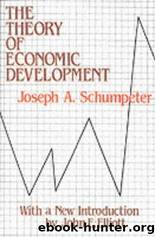The Theory of Economic Development by Schumpeter Joseph A

Author:Schumpeter, Joseph A. [Schumpeter, Joseph A.]
Language: eng
Format: epub
Tags: Finance, Economics, Business, Politics, Social Science, Sociology, Society, Entrepreneurship, History, Philosophy, Non-Fiction
ISBN: 9780878556984
Amazon: 0878556982
Goodreads: 134799
Publisher: Routledge
Published: 1934-12-12T08:00:00+00:00
CAPITAL
It is now time to give expression to a thought which has long been awaiting formulation and which is familiar to every businessman. That form of economic organisation in which the goods necessary for new production are withdrawn from their settled place in the circular flow by the intervention of purchasing power created ad hoc is the capitalist economy, while those forms of economy in which this happens through any kind of power of command or through agreement of all concerned represent non-capitalistic production. Capital is nothing but the lever by which the entrepreneur subjects to his control the concrete goods which he needs, nothing but a means of diverting the factors of production to new uses, or of dictating a new direction to production. This is the only function of capital, and by it the place of capital in the economic organism is completely characterised.
Now what is this lever, this means of control? It certainly does not consist of any definite category of goods, of any definable part of the existing supply of goods. It is generally recognised that we meet with capital in production and that it is useful in some way or other in the productive process. Hence we must also see it somewhere in operation in our case of carrying out new combinations. Now all the goods which the entrepreneur needs are on the same level from his standpoint. He wants the services of natural agents, of labor, of machinery, of raw material, all of them equally and in just the same sense, and nothing distinguishes one of these wants from the others. Of course this is not to say that there is no relevant difference at all between these categories of goods. On the contrary there are certainly differences, even though their significance was and still is overestimated by many theorists. But it is clear that the entrepreneur's behavior is the same towards all these categories: he buys all of them for money, for which he calculates or pays interest, without distinction, whether they are tools or land or labor. They all play the same part, are equally necessary for him. In particular it is quite immaterial whether he begins his production as it were ab ovo, that is merely buys land and labor, or whether he also acquires already existing intermediate products instead of producing them himself. Finally, if he should acquire consumption goods this would make no fundamental difference either. Nevertheless, it would look as if consumption goods had the first claim to be emphasised, especially if one accepted the theory that the entrepreneur âadvancesâ consumption goods to the possessors of productive means, in the narrower sense of the word. In this case these goods would be characteristically different from other goods; they would play a special rôle, and indeed precisely the one which we assign to capital. From this it would follow that the entrepreneur would exchange productive services for consumption goods. Then we should have to say that capital consists of consumption goods.
Download
This site does not store any files on its server. We only index and link to content provided by other sites. Please contact the content providers to delete copyright contents if any and email us, we'll remove relevant links or contents immediately.
International Integration of the Brazilian Economy by Elias C. Grivoyannis(107576)
The Radium Girls by Kate Moore(12011)
Turbulence by E. J. Noyes(8014)
Nudge - Improving Decisions about Health, Wealth, and Happiness by Thaler Sunstein(7689)
The Black Swan by Nassim Nicholas Taleb(7097)
Rich Dad Poor Dad by Robert T. Kiyosaki(6590)
Pioneering Portfolio Management by David F. Swensen(6278)
Man-made Catastrophes and Risk Information Concealment by Dmitry Chernov & Didier Sornette(5993)
Zero to One by Peter Thiel(5778)
Secrecy World by Jake Bernstein(4735)
Millionaire: The Philanderer, Gambler, and Duelist Who Invented Modern Finance by Janet Gleeson(4456)
The Age of Surveillance Capitalism by Shoshana Zuboff(4272)
Skin in the Game by Nassim Nicholas Taleb(4232)
The Money Culture by Michael Lewis(4182)
Bullshit Jobs by David Graeber(4176)
Skin in the Game: Hidden Asymmetries in Daily Life by Nassim Nicholas Taleb(3986)
The Dhandho Investor by Mohnish Pabrai(3749)
The Wisdom of Finance by Mihir Desai(3726)
Blockchain Basics by Daniel Drescher(3571)
